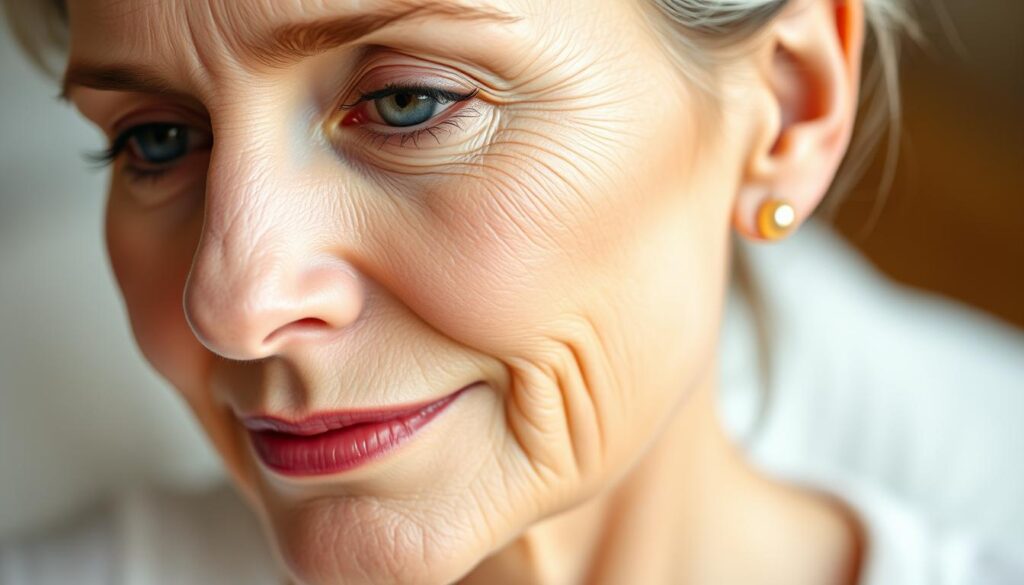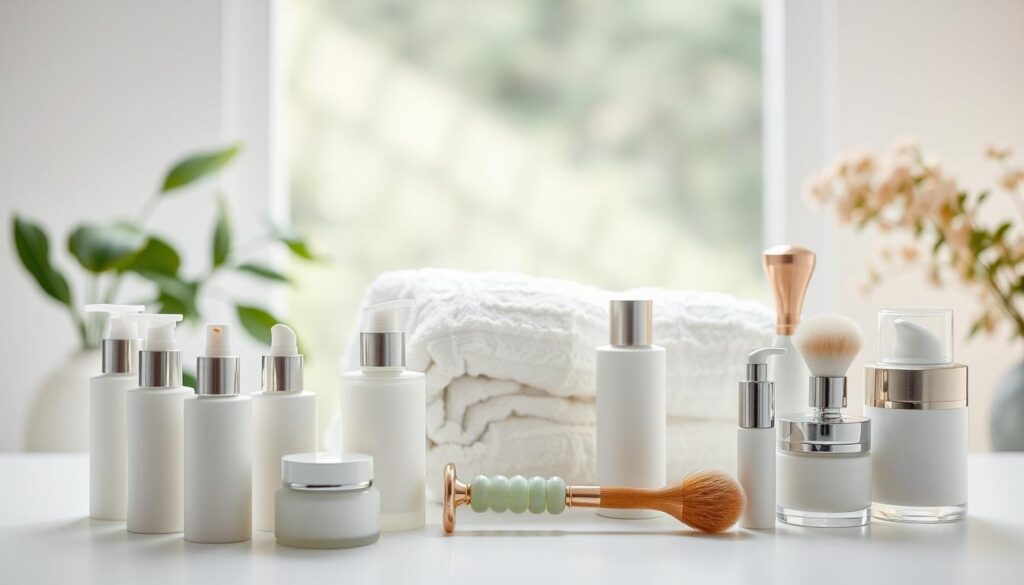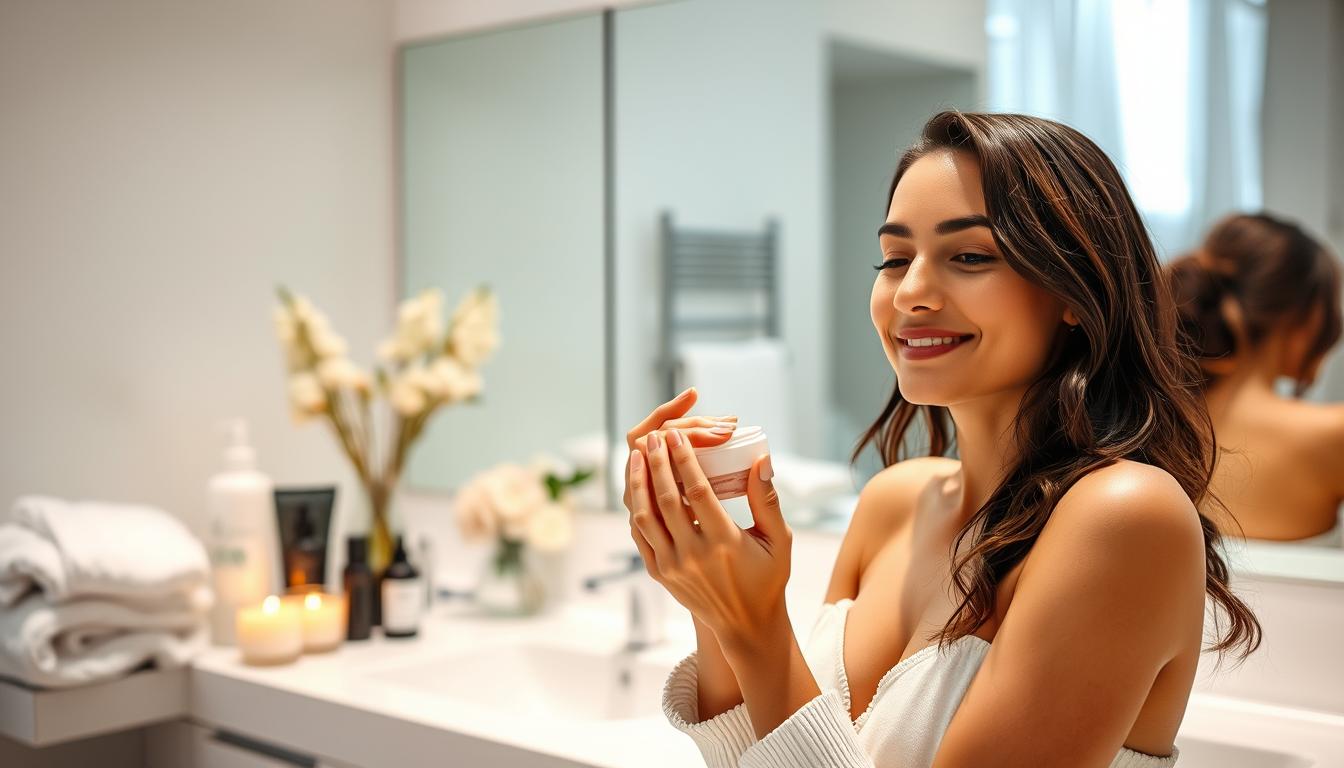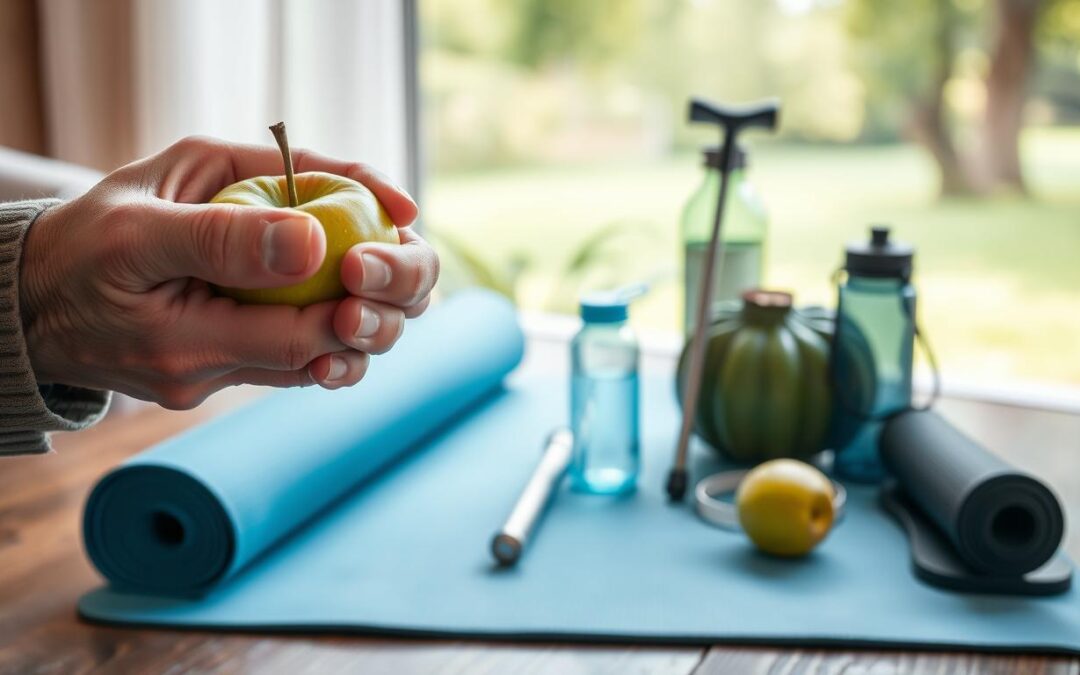Walking down the skincare aisle can feel like a maze of choices. From serums to creams, the search for anti-aging tips often leaves you more confused than confident. How do you cut through the noise and find what truly works for youthful skin?
This guide cuts through the chaos. We’ll share science-backed strategies to fight signs of aging without the guesswork. Discover how simple steps—from daily sunscreen to mindful habits—can make a real difference.
Key Takeaways
- Wear SPF 30+ sunscreen daily to block UV damage.
- Limit sun exposure between 10 a.m. and 4 p.m. to reduce skin damage risks.
- Avoid smoking to prevent blood vessel narrowing and premature aging.
- Combine moisturizers with SPF for daily sun protection.
- Maintain a balanced diet low in refined carbs to support youthful skin.
Understanding the Aging Process
Anti-aging begins with understanding how your body changes over time. Let’s break down the science behind aging and how small changes can make a big difference.

What Happens to Your Skin
As you enter your 30s, skin cells renew more slowly. This leads to thinner skin, reduced oil production, and loss of elasticity. Wrinkle prevention starts here. Fine lines form as collagen breaks down, and gravity pulls skin downward, creating sagging. Environmental factors like sun exposure speed up these changes.
The Role of Collagen
- Collagen fibers shrink by about 1% yearly after age 20
- Loss causes skin to lose plumpness and firmness
- Supplements or skincare with vitamin C can support collagen production
Genetics vs. Lifestyle
Genetics account for 60% of how you age, but lifestyle choices control the remaining 40%. Longevity secrets include:
- Maintaining a nutrient-rich diet
- Protecting skin from UV rays
- Managing chronic stress
“Your habits today shape your skin tomorrow.”
While you can’t change your genes, adopting proactive habits like daily moisturizing or regular exercise can counteract aging effects. Small shifts in routine create lasting longevity secrets for healthier skin and body.
Essential Skincare Products
Maintaining a consistent skincare routine starts with the right products. Three essentials—moisturizers, vitamin C, and sunscreen—form the backbone of any anti-aging strategy. These products work together to hydrate, protect, and repair skin, making them key to slowing visible signs of aging.
Moisturizers and Their Benefits
Moisturizers lock in hydration to prevent dryness and fine lines. Look for ingredients like hyaluronic acid, which holds 1,000 times its weight in water, and ceramides to reinforce the skin barrier. Peptides signal skin cells to produce collagen, reducing wrinkles over time. Apply after cleansing for best results.
Vitamin C: A Powerful Antioxidant
Vitamin C serums neutralize free radicals and boost collagen production. Dr. Stein notes, “This vitamin is a co-factor in collagen synthesis, plumping skin and minimizing wrinkles.” Opt for L-ascorbic acid formulas (10-20% concentration) and store in dark containers to preserve potency. Studies show visible improvements in skin texture after three weeks of daily use.
Sunscreen: Your Best Defense
Sunscreen is non-negotiable. Use broad-spectrum SPF 30+ daily, reapplied every two hours outdoors. Physical sunscreens (zinc oxide/titanium dioxide) sit on the skin’s surface, while chemical sunscreens absorb UV rays. Both types prevent UVA/UVB damage, the top cause of premature aging.
Pairing a consistent skincare routine with anti-aging supplements like oral collagen boosters can enhance results. Start simple—these three steps form the foundation for younger-looking skin.
Nutrition for Youthful Skin
Your plate holds the power to turn back time. Choose anti-aging foods and a healthy lifestyle to fuel radiant skin from within. Every bite and sip matters in this natural skincare strategy.
Foods That Promote Collagen Production
Protein-rich meals like bone broth and fatty fish boost collagen. Citrus fruits and bell peppers deliver vitamin C, a collagen-building powerhouse. Nuts and seeds add zinc, which repairs skin cells. A 2012 study found olive oil’s 73% monounsaturated fats cut visible aging signs.

Hydration: The Importance of Water
“Over 2 liters of water daily enhances skin hydration and elasticity,” say dermatologists.
Dehydration flattens skin’s plumpness. Water flushes toxins and keeps pores clear. Add slices of cucumber or lemon to infuse hydration with flavor.
Antioxidants and Their Sources
- Green tea’s EGCG compounds shield against UV damage.
- Dark chocolate (70%+ cocoa) fights wrinkles via flavonols.
- Tomatoes’ lycopene acts as a natural sunscreen.
A 2021 trial showed cocoa’s antioxidants reduced wrinkle depth by 19% over 12 weeks. Pair these with flaxseeds for hydration or pomegranates to boost collagen. Skip sugary snacks—they trigger collagen-damaging glycation.
Adopting these habits creates a shield against aging from the inside out. Every meal is a chance to nourish your skin’s foundation.
The Power of a Consistent Routine
Imagine skincare as brushing your teeth: simple habits repeated daily make all the difference. Consistency in your skincare routine unlocks real anti-aging tips without requiring complicated steps. Even a basic regimen done daily can slow visible signs of aging by supporting skin’s natural repair processes.

- Morning Routine: Cleanse gently, apply moisturizer with SPF 30+ (like L’Oréal Paris UV Perfect Sunscreen), and layer antioxidants.
- Evening Ritual: Double cleanse to remove makeup, use retinol (try L’Oréal Paris RevitaLift), and seal with a ceramide-rich cream.
Exfoliation is non-negotiable for glowing skin. Chemical exfoliants (AHAs) dissolve dead cells, while physical scrubs gently polish. Oily skin may exfoliate 2-3x weekly; sensitive skin 1x weekly. Look for L’Oréal Paris Bright Reveal products for dark spot reduction paired with this step.
“Small daily rituals build habits that compound over time.”
Stick to your routine for 8-12 weeks to see smoother texture and fewer lines. Pair with sleep on silk pillows to reduce friction. Over time, your skin’s barrier strengthens, retaining moisture and fighting environmental stressors. Consistency isn’t about perfection—it’s about showing up every day with intention.
Lifestyle Factors Affecting Aging
Adopting a healthy lifestyle and uncovering longevity secrets starts with daily habits that protect your skin and overall health. Stress and sleep play key roles in how quickly aging signs appear.

Stress Management Techniques
Chronic stress boosts cortisol, triggering inflammation that weakens collagen. Try these proven methods to reduce stress:
- Mindfulness meditation (10 minutes daily)
- Deep breathing exercises before bed
- Walking or yoga for natural stress relief
The Impact of Sleep on Skin Health
Sleep is your skin’s repair window. During rest, collagen production peaks and toxins flush out. Follow these tips for optimal results:
- Sleep 7–9 hours nightly
- Use silk pillows to prevent wrinkles
- Avoid screens 1 hour before bed
“Individuals with poor sleep patterns showed 20% more fine lines compared to those with consistent sleep routines, per dermatological studies.”
Smoking and excess alcohol narrow blood vessels, starving skin of oxygen. The Dunedin study found participants with unhealthy habits aged 10+ years faster biologically. Prioritizing sleep and stress management are foundational longevity secrets supported by research like the Life’s Essential 8 framework, which links lifestyle changes to a 35% lower risk of heart disease. Small shifts today create visible differences tomorrow.
Incorporating Exercise for Better Skin
Exercise isn’t just for building muscles—it’s a key part of a healthy lifestyle that boosts your youthful skin. Regular movement improves blood flow, delivering oxygen and nutrients to skin cells while flushing out toxins. Studies show aerobic exercise can increase antioxidant production by 20-30%, shielding skin from damage caused by pollution and UV rays.

How Exercise Boosts Circulation
When you move, your heart pumps faster, enhancing circulation that nourishes skin cells. Research from Jones et al. (2015) found moderate exercise increases collagen production by up to 20%, keeping skin plump and firm. Resistance training adds muscle tone, while yoga lowers cortisol—stress hormones that break down collagen.
Best Moves for Your Skin
- Aerobic workouts: 30-minute walks, cycling, or swimming 5x/week improve circulation and reduce oxidative stress.
- Strength training: Lifting weights 2-3x/week builds muscle under skin, creating a lifted appearance.
- Yoga/Pilates: Reduces stress-induced collagen breakdown and improves sleep for radiant skin.
Tip: Wear breathable fabrics and cleanse post-workout to avoid sweat-induced breakouts. Pair exercise with hydration and sunscreen (SPF 30+) for maximum results. Your skin thrives when you move—so lace up those sneakers!
Professional Treatments Worth Considering
Professional treatments can enhance your anti-aging tips by targeting deeper skin concerns. These procedures offer advanced wrinkle prevention and can boost collagen for smoother skin. A dermatologist can recommend the best approach for your goals.
- Chemical Peels: Choose from superficial, medium, or deep peels. Glycolic acid and TCA solutions exfoliate layers of skin. Deeper peels may cause temporary redness but deliver longer-lasting improvements.
- Microdermabrasion: Uses crystal or diamond-tip tools to remove dead skin cells. Ideal for refining texture and reducing fine lines, but not suited for severe wrinkles.
- Laser Treatments: Ablative lasers resurface skin, while non-ablative types stimulate collagen without downtime. The Sofwave device, FDA-approved for lifting brows and necks, uses light energy to reduce lines and boost skin elasticity. Fraxel Restore lasers may require 3 sessions spaced monthly for optimal results.
Combining these treatments with daily sunscreen (SPF 30+) strengthens wrinkle prevention. Costs vary, but results improve with consistent care. Botox users may need touch-ups every 3–5 months. Always pair professional services with a consistent at-home routine for lasting improvements.
DIY Anti-Aging Remedies
Transform your skincare routine with natural remedies crafted at home. These simple recipes use everyday ingredients to boost collagen, hydrate skin, and fight signs of aging. Plus, they’re often gentler on your wallet than store-bought products.
“The earth’s bounty holds secrets to timeless beauty.” – Holistic Beauty Specialist
Natural Ingredients for Anti-Aging Masks
Start with these kitchen staples proven to work:
- Avocado: Blends with honey for a mask that boosts elasticity. A 2013 study found vitamin E in avocado improves skin suppleness by 20%.
- Aloe Vera Gel: Daily use reduced wrinkles by 20% in 90 days (2009 study). Mix with yogurt for extra exfoliation.
- Green Tea: Brewed into a paste, its antioxidants cut inflammation. A 2015 trial noted smoother skin texture after 8 weeks.
Essential Oils for Skin Care
Always dilute oils in carrier oils (1-2% concentration) to avoid irritation:
- Frankincense: Fades scars and tightens skin. A 2016 study paired it with coconut oil for visible results.
- Rosehip Oil: Rich in vitamin C, it boosts collagen. Apply nightly for brighter skin in 6 weeks.
- Lavender: Calms redness and promotes healing. Pair with jojoba oil for sensitive skin.
Pair these natural remedies with anti-aging supplements like omega-3s for maximum impact. Consistency matters—most 4-6 weeks to see results. Always patch test and store homemade masks in a cool place.
The Importance of Sun Protection
“Sunscreen is hands-down the most important product in your anti-aging routine,” says dermatologist Stein. “Protecting skin from UV rays prevents 80% of visible aging.” This simple step is your first line of defense in anti-aging tips to delay wrinkle formation.
UV rays damage collagen and accelerate wrinkle prevention efforts. Here’s how to choose and use sunscreen effectively:
Types of Sunscreens to Consider
- Mineral (physical): Zinc oxide/titanium dioxide reflect UV rays. Best for sensitive skin but may leave a white cast. New formulations reduce this issue.
- Chemical sunscreen: Absorb UV rays like a sponge. Great for sheer application but may irritate skin.
- Look for SPF 30+ and broad-spectrum labels. SPF 30 blocks 97% UVB rays—enough for daily use. Outdoor activities? Opt for SPF 60 or higher.
How to Properly Apply Sunscreen
- Use enough: A shot glass holds one ounce—enough for full-body coverage. Faces need a half teaspoon.
- Apply 20 minutes before exposure. Reapply every 2 hours after swimming/sweating.
- Cover ears, neck, and hands—common missed spots.
Combine sunscreen with hats, UV-protective clothing, and shade during 10 a.m.-4 p.m. hours. Even on cloudy days, 80% of UV rays penetrate clouds. Daily use slows collagen breakdown, making it the cornerstone of effective anti-aging tips. Protect skin year-round to avoid cumulative damage that shows up decades later.
Myths and Facts About Aging
Anti-aging doesn’t require costly secrets or extreme measures. Separating facts from myths helps you protect your skin without guesswork. “Healthy aging starts with small, consistent steps,” says skincare expert Samantha Stein. Embrace longevity secrets like anti-aging foods and evidence-based habits for lasting results.
Common Misconceptions Debunked
Genetics aren’t your only destiny. While DNA plays a role, lifestyle changes like sun protection and diet matter more. Expensive products don’t guarantee results—formulation beats price tags. Waiting until wrinkles appear to act? Prevention works best, but it’s never too late to start. Facial exercises? They can deepen lines over time. Smoking accelerates aging, causing wrinkles and jowls earlier than nonsmokers.
The Truth About Wrinkle Creams
Effective creams rely on science-backed ingredients. Retinoids, antioxidants, and peptides show real results. Creams touting collagen or plant stem cells often lack proof. Results take time—even top products need weeks to show subtle improvements. Pair creams with sunscreen and anti-aging foods like berries and leafy greens for best outcomes.
Healthy aging means knowing what works. Focus on routines backed by research and ingredients proven to help. Small choices—like daily SPF, hydration, and smart skincare—add up to visible, long-term benefits. Your skin’s health thrives on consistency, not quick fixes.









